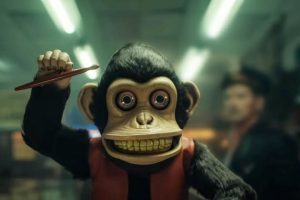
Hal Shelburn has a monkey on his back. Not an actual monkey, mind you, but one of those grinning, wind-up, midcentury percussion-playing simians that, outside of the jaundiced world of supernatural fiction, may only be the culprit for violating a noise ordinance or two. But in writer-director Osgood Perkins’ The Monkey, death follows every thwack of the snare.
Hal, played by Theo James, is the reluctant protagonist of The Monkey, who, with his twin brother Bill (also James) discovered the titular toy while going through the closet detritus of the father who abandoned them. We first meet the siblings in grade school — Christian Convery plays both characters as kids — where the monkey becomes just another tool for the cruel Bill to bully the meek Hal. But when their wind-ups lead to the seemingly indiscriminate deaths of those around them, they agree to destroy the cursed plaything. Most of The Monkey is set 25 years later, where its impossible reappearance opens old wounds, emotional and literal.
If this conceit sounds familiar, it’s because the King of horror fiction popularized it. Perkins adapted his screenplay — freely, one must add — from Stephen King’s 1980 short story of the same name. King’s slimmer body count and his victims’ means of execution are tamer than their myriad counterparts in Perkins’ film, which has all the excess splatter of a Jackson Pollock fever dream. Once the drumstick lands on its target, everyday objects become vessels for mortal danger: a piece of rope, a tackle box, a hibachi knife in the hands of an innocent chef. Whereas King genteelly killed off minor characters and animal life, there are no sacred cows, or cast members, in Perkins’ torrent of bloodshed. Tatiana Maslany fans, enjoy her while she lasts.
If there’s a seed of metaphorical subtext in the film — something about fathers’ intergenerational inability to protect their kids, and running from problems rather than confronting them — it sprouted from King, who has always woven earthly domestic dysfunction into his flights of fancy. Perkins’ creative contribution seems to be to lean into an inscription branded onto the monkey’s custom container that reads “like life.” In other words, its kills are, like life, random, brutal, uncontrollable and short.
Perkins’ hollow nihilism is conjoined with an equally empty nostalgia. The first third of The Monkey is set in a 1999 that resembles the late ’70s environs of King’s contemporaneous story. Bill and Hal receive sex-ed in school from a grainy slide projector; their house is an eyesore of gaudy wood paneling; their uncle (played by Perkins himself) sports sideburns from a different period.
Those with a penchant for decoding cultural and temporal Easter eggs will find plenty in Perkins’ script and mise-en-scène. In one scene outside a movie theater — circa the early to mid ’90s, most likely — its marquee reads only the words “The Streaming.” A minor character is given the name Annie Wilkes, one she shares with a certain murderess from another piece of Stephen King I.P. The director enjoys punking us, but to what end, outside of a few dopamine jolts for the Fangoria set?
Perkins throws so much content against the proverbial cinema wall that some of his javelins stick. One character’s inadvertent double entendre when finally landing on the right key to open a door to her demise (“process of elimination!”) should cause a mordant chuckle, and Elijah Wood delivers a game cameo as the obnoxious wellness guru who mostly raises Hal’s son Petey (Colin O’Brien).
But The Monkey’s inability to find an effective tone and stick with it dooms the venture. It flirts with both camp and gravitas but fully embraces neither. With few exceptions, Perkins’ dialogue lacks punch or genuine wit, preferring repetitive catch phrases that don’t catch on, and awkward beats that drag on listlessly. Even the elaborate Grand Guignol death spirals feel tiresome, lacking the wicked invention of the more successful slasher-comedy hybrid in theaters now, Heart Eyes.
The Monkey is doubly disappointing when considering its stature as the follow-up to Perkins’ consistently eerie serial-killer feature Longlegs (2024), a film as genuinely unsettling as any in recent memory, and whose comparisons to The Silence of the Lambs were justified. The Monkey, on the other hand, can surely wait for “the streaming.”
THE MONKEY. Director: Osgood Perkins; Cast: Theo James, Tatiana Maslany, Colin O’Brien, Rohan Campbell, Sarah Levy, Adam Scott, Elijah Wood; Distributor: Neon
Rated R; Now playing at most area theaters